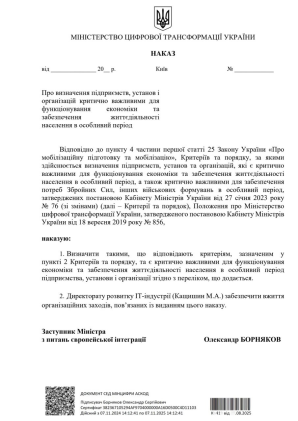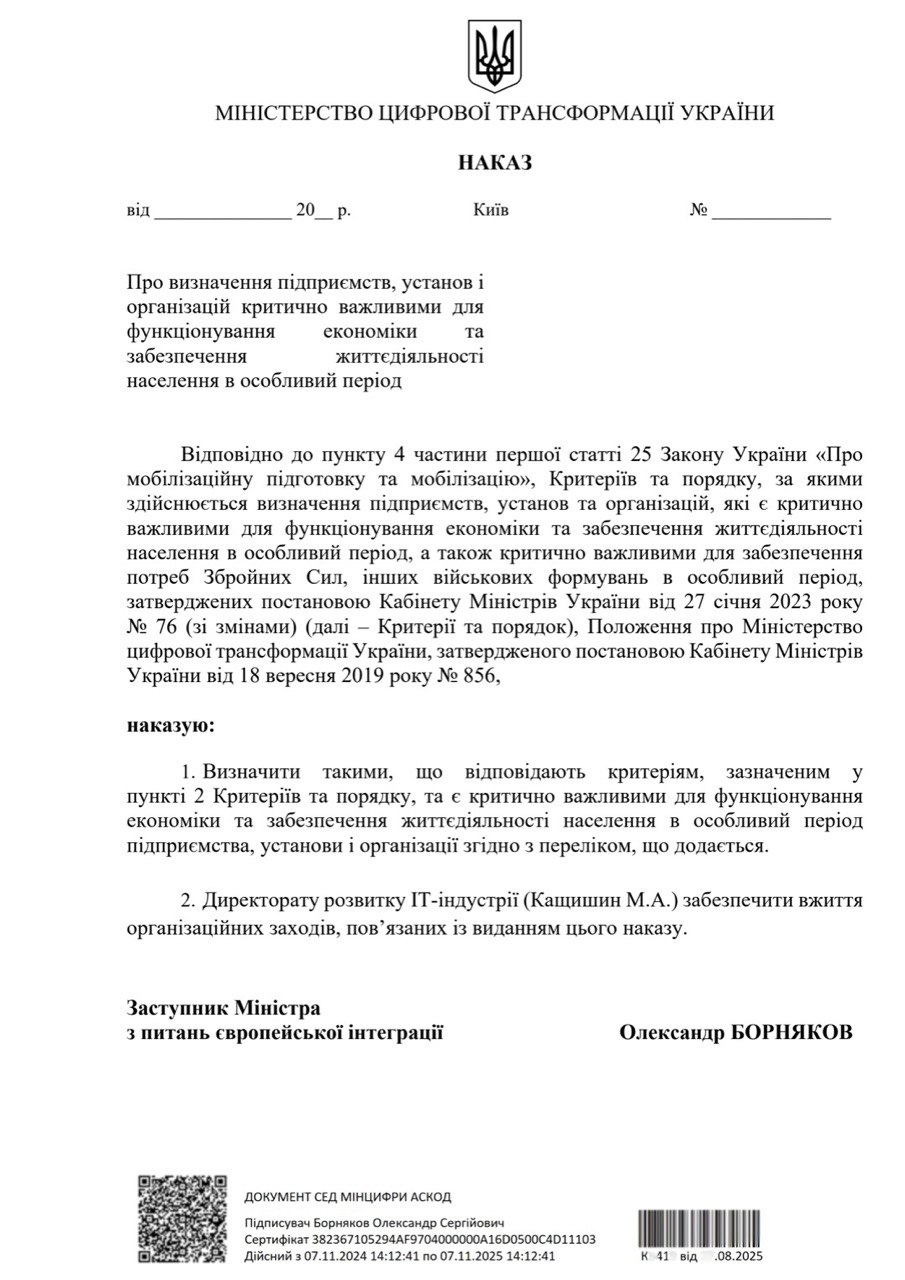How to Confirm the Status of a Critically Important Enterprise
Cost of services:
Reviews of our Clients
... our work on joint projects assured us of your high level of professionalism
Today, critically important enterprises are a core part of the country’s infrastructure. Companies that obtain this status gain not only the right to reserve key employees from mobilization but also much-needed stability: the ability to plan operations, fulfill contracts, and maintain uninterrupted production.
In practice, however, securing this status often feels like navigating a legal maze. The confirmation procedure is complex, and every decision and document matters. This is why more and more businesses seek legal support to complete the process successfully.
We work with companies going through this procedure and consistently see how a well-designed legal strategy helps not only obtain the status but also protect the business from future risks.
In this article, we break down how a company can confirm its critically important status, what documents are required, why some applications are rejected, and how to avoid the most common mistakes.
Successful case: Reserving IT Specialists and Obtaining the Diia.City Tax Benefit
Who Can Obtain the Status of a Critically Important Enterprise
According to Resolution No. 76 of the Cabinet of Ministers of Ukraine, adopted on January 27, 2023, this status is granted to companies that have a significant impact on the economy, national defense, and the essential functioning of the population.
In other words, your business does not simply need to be large or profitable; it must be strategically important for the country and society.
We have already provided an overview of the core criteria used to determine whether an enterprise qualifies as critically important. Here, we will focus on the industries that most commonly receive this status:
- energy sector companies (electricity, gas, heat, water supply);
- logistics companies (transportation, delivery of humanitarian aid, food, and fuel);
- producers of food and essential consumer goods;
- medical institutions, pharmaceutical companies, laboratories;
- IT companies that support government systems or provide critical digital services;
- defense industry enterprises fulfilling state contracts.
What Is the Validity Period of the Status of a Critically Important Enterprise?
The status of a critically important enterprise is granted temporarily – usually for one year, or for the duration of a specific contract if that period is shorter.
Once this term expires, the enterprise must confirm its eligibility again, following the same procedure as during the initial application.
Please note: In practice, many companies fail to submit their renewal documents on time. This can lead to the loss of status and, as a result, the loss of the ability to reserve key employees.
For that reason, the status renewal process must be approached with the same level of diligence as the initial application.
You might also like: How Can a Company Obtain Critically Important Status for Reserving Employees?
Where to Submit Documents to Confirm Critically Important Status
The document package for obtaining or renewing the status of a critically important enterprise is submitted either to the state authority regulating the company’s industry or to the regional military administration (RMA), depending on whether the company falls under a specific ministry.
The main submission options include:
- To the central executive authority (a ministry), if the company operates within a specific industry. For example, energy companies apply to the Ministry of Energy, transport companies to the Ministry for Communities, Territories and Infrastructure Development, medical institutions to the Ministry of Health, IT companies to the Ministry of Digital Transformation, manufacturing enterprises to the Ministry of Economy or the Ministry of Strategic Industries.
- To the regional military administration (RMA), if the enterprise does not have industry-specific oversight or operates exclusively at the regional level. In this case, the RMA reviews the documents and decides whether to grant the status.
Important Technical Requirements
In most cases, documents are submitted by email to the official address of the relevant ministry or regional military administration (RMA). All files must be prepared correctly:
- signed by the head of the enterprise;
- certified with a qualified electronic signature (QES);
- fully compliant with the established requirements for the structure and content of the document package.
Please note! Before submitting your documents, it is recommended to check the current requirements with the specific ministry or RMA, as submission procedures may vary slightly depending on the sector.
What Documents Are Required to Confirm Critically Important Status?
To apply for confirmation of a company’s critically important status, you must prepare the following documents:
- a cover letter with justification explaining why the enterprise is critical (description of activities, importance for the economy or defense, and impact on essential services for the population);
- copies of corporate documents (extract from the Unified State Register, charter, etc.);
- a certificate of average employee headcount;
- a certificate of accrued wages;
- a certificate confirming tax payments for the latest reporting period;
- information on production volumes or the scope of services provided;
- proof of fulfillment of contracts, including international contracts (if applicable).
Please note: The exact list of required documents may vary depending on the company’s industry and the authority reviewing the request (a ministry or a regional military administration).
You might also like: Hiring Employees Subject to Military Service: Military Records During Employment
Typical Mistakes When Confirming Critical Status
In practice, we see that most refusals to confirm critically important status are caused not by the substance of an application, but by the way the documents are prepared and submitted.
A company may fully meet all the criteria, yet lose its chance because of an incomplete or poorly prepared document package.
Here are the most common mistakes:
- Insufficient or superficial justification of critical importance.
Many companies limit themselves to general statements like “important for the economy,” without providing data, analytics, or specific performance indicators. Without this, the commission has no grounds to recognize the enterprise as critically important. - Submitting an incomplete document package or files in the wrong format.
It is not enough to simply have the required certificates; they must comply with the structure and requirements of the authority reviewing the documents. - Tax debt or financial indicators that do not match the criteria.
For example, the average salary may be below the threshold set by the resolution, or the information in the certificates may not match tax reports. - Ignoring sector-specific requirements.
Companies often submit a standard document package without considering additional criteria set by the Ministry of Defense, the Ministry of Health, or the Ministry of Digital Transformation for their respective sectors. - Technical inconsistencies in company data.
Any mismatch between the information in the charter, certificates, and the Unified State Register, even differences in spelling or activity codes (KVEDs), can formally make the application impossible to review.
In practice, only a portion of companies succeed on the first attempt. The process requires not just filling out forms, but building a well-structured argument that the state commission can evaluate and accept.
This is why legal support is a key factor for success that should be integrated from the very beginning of the critical-status confirmation process.
Confirming Critically Important Status: Legal Support
Obtaining or confirming the status of a critically important enterprise is a process where small details determine the final outcome.
Our law firm provides full legal support to help you secure a positive decision quickly and with minimal risk.
We assist with:
- conducting a preliminary assessment to determine whether your company meets the required criteria before you submit the application;
- preparing a cover letter and justification that comply with government requirements and convincingly demonstrate your enterprise’s significance for the economy, defense, and population;
- collecting and reviewing all documents to eliminate mistakes that often lead to refusals;
- organizing the submission of the document package to the relevant ministry or regional military administration (RMA);
- managing communication with state authorities and overseeing the review process.
If you have already received a refusal, we can prepare well-reasoned objections or handle a repeat submission on your behalf.
Our legal support is a reliable path to the stability of your business. You receive not just properly prepared documents, but peace of mind, confidence in the protection of your team, and the ability to operate steadily even during wartime.
Contact us and start preparing to confirm your critically important status today!
Our clients












